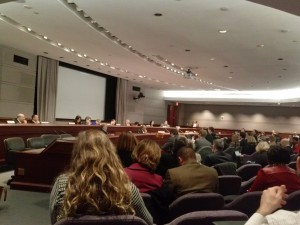HARTFORD, CT—On Friday morning at 10:00 am, the Education Committee convened at the Legislative Office Building to hold an informational forum to discuss the implementation of the Common Core curriculum standards in Connecticut. Commissioner of Education Stefan Pryor and Executive Director of the Council of Chief State Schools Officers Chris Minnich were among the proponents of the Common Core that presented at the forum chaired by Senator Andrea Stillmann and State Representative Andrew Fleischmann.
Citing the high remediation rates in both Connecticut’s state university and community colleges and drawing up pie charts showing that 56% of employers in the state were having trouble hiring qualified workers, Pryor presented the use of Common Core standards as a vital measure to improve the future of students and the economy.
“Even if we look at the future of our work and at what is required of our youngsters, the common core is going in the right direction. And more importantly, our educators… have long been saying that we shouldn’t be focused on rote knowledge and pure recall, on drilling kids in our classroom. We want to be focusing on higher order thinking skills, critical thinking skills, on the kinds of approaches that will enable our youngsters to succeed in college and careers,” said Pryor. According to Pryor, in 2020, around 60% of the jobs in Connecticut’s economy would require a college or other higher education degree and the state schools simply aren’t churning out enough college- and career-ready students.
Minnich expressed his understanding that while everyone was in support of the notion of having higher standards for students, they found the Common Core standards controversial because of how it was being implemented and the process of how the official document was written. He emphasized that there was public involvement in every state and that educators played a major role in the process of writing the Common Core standards, adopted in July 2010 in Connecticut.
“This is really giving teachers the flexibility they need to be great teachers,” said Minnich, who believes that teachers can still freely decide on how they want to tailor their lessons to local needs to meet national standards. Minnich stated that approximately 73% of teachers polled were in support of the Common Core .This statistic, which seems to be at odds with the popular conception that most teachers didn’t support the Common Core standards, was a subject of scrutiny and repeatedly brought to question throughout the duration of the forum.
Minnich also reported that the ACT, Collegeboard, and the business community also offered feedback on standards set in the Common Core to ensure that it was comprehensive and contained what future employers were looking for in employees.
“The vast majority of our country is aiming towards higher standards. Are we going to glide towards them or are we going to be left behind?” asked Minnich, citing that 45 out of 50 states had accepted the standards and that states like Kentucky and Tennessee had achieved great gains on NAEP test scores.

February 28th, 2014
Photo: Ada Chai
A heated Q&A session followed the presentations of Pryor and Minnich, though each of the 16 representatives of the state present was limited to asking only one question as Minnich had to depart early.
Hurried along by Representative Fleischmann, the representatives voiced concerns, as parents and on behalf of parents and teachers, about the flawed implementation of the common core that were pressing “too much too quickly” on children and putting a strain on small school districts that had to write their own curriculum to match the core curriculum standards. Representative Bolinsky mentioned “disenfranchised and frightened” educators and parents with children coming home terrified of tests, who were questioning the intent behind the Common Core standards and asked about how they intended to engage the community in this conversation. Concerns were also raised over the use of technology and the failure of the common core to include social and emotional development of children as part of the curriculum.
At the forum, Pryor also announced that Governor Malloy was creating a task force for January of 2015 to help implement the Common Core Standards that would include educators to ensure practitioner input. He also made assurances that more support, including a team of Common Core coaches to aid professional development and a “Dream Team” that would make model units, lesson plans and other resources available through their website (www.ctcorestandards.org), would become available to teachers.
Despite Pryor and Minnich’s favorable presentation of the controversial Common Core standards, there were some among the general public who were not convinced that the implementation of the standards would make students critical thinkers or more competitive in the future nationally and internationally. One such group, consisting of parents and teachers, was conspicuously dressed in bright red shirts with an octagon shaped stop sign which read “Stop the Common Core in CT”. They apparently disagreed that the Common Core standards would lead to students becoming critical thinkers.
“We need to let teachers teach so that children become critical thinkers, not robots that follow a format,” said one of the red-shirted parents, Malcom McGough. McGough views the implementation of the Common Core standards as an invasive act carried out by the government that treats children like guinea pigs.
“It is clearly against what the founding fathers wanted,” he said, claiming that the standards were nothing less than an attempt to indoctrinate students rather than allowing them the freedom necessary to become critical thinkers, the freedom which in the first place is what led to innovations that made the United States one of the greatest nations in the world.